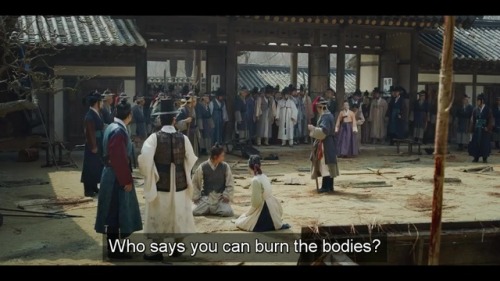johanirae:osaka-sukiyanen:riya-in-the-valley:I understand that being unable to give your loved ones
johanirae:osaka-sukiyanen:riya-in-the-valley:I understand that being unable to give your loved ones a proper burial is incredibly hard. But if you choose the corpses of your dead relatives over the safety of living human beings then I’m sorry but you deserve to become zombie food. i’m no expert, but i think it’s less about “giving a proper burial to the loved ones” (as in an “emotional” matter), and more about the neo confucianism which ruled joseon society at that time, and therefore, an ethical and societal matter … particularly the concepts of filial piety and body integrity, even after death. The interesting point here, this social and philosophical system (where obedience, respect, hierarchy, integrity of both individual and social bodies are capital) is clashing with the classic rules of a zombie apocalypse, where decapitation and incineration (aka the ultimate offences against someone’s physical integrity) are actually the only way to survive.For these nobles, guarantors of the neo confucianism rules (but also for some of the peasants, who were horrified when Yeong Shin began to burn the bodies), the remedy appears as horrendous as the monsters themselves.(btw, it’s interesting to note that both the Crown Prince and Yeong Shin, who litterally fight for their own survival and more importantly, for the others’ survival, already broke those social and ethical rules at the begining of the show (cf Crown Prince’s relations with his father and the kingdom, and Yeong Shin … well … you know what he did :P ) (but yes, those who choose the deads instead of the livings deserve to become zombie food XD)I think it’s quite interesting the way the drama presents these key building blocks of the society back then - loyalty, rank, philosophy, religion, but also shows little all these things matter in life and death situations, and in fact are often hindrances to survival. -- source link
#kingdom







